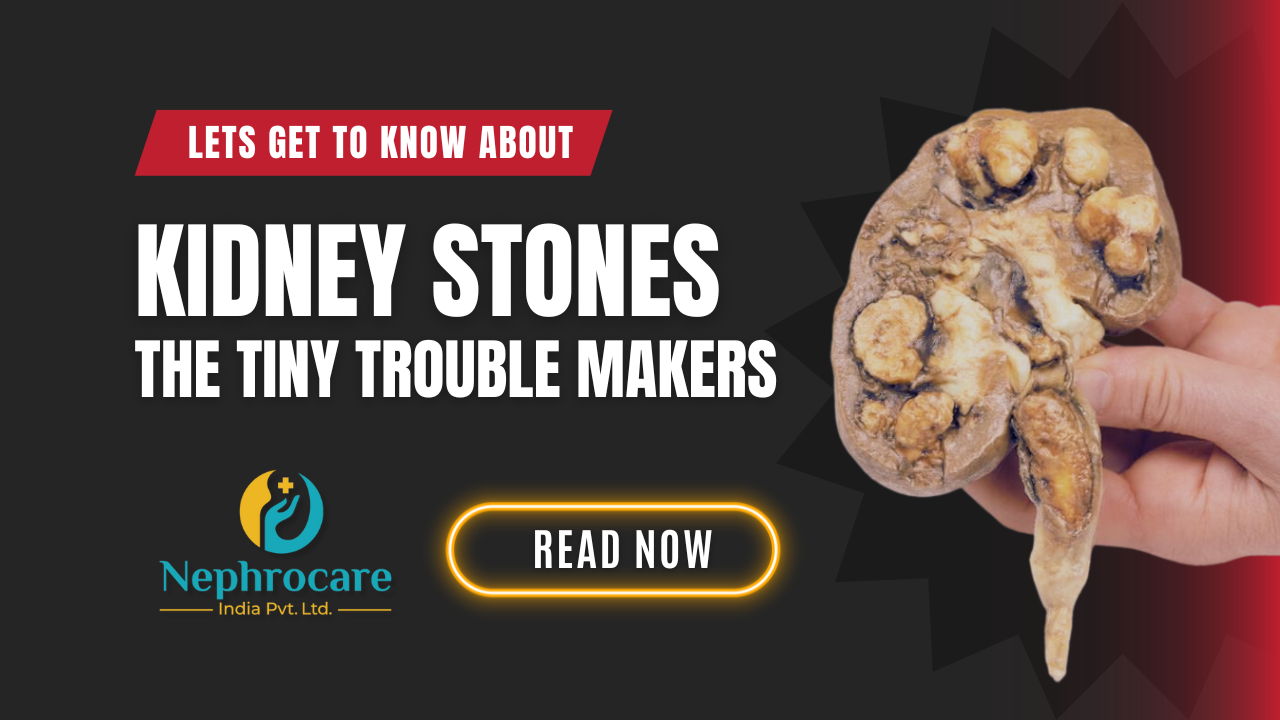
Do you feel a mysterious ache in your lower back or a sudden, stabbing pain that leaves you writhing in agony? It may be due to the mischievous work of kidney stones, formed by the tiny crystals that gather in the darkness of your kidneys. Kidney stones, medically known as nephrolithiasis or renal calculi, are solid, pebble-like deposits that form in the kidneys which can cause excruciating pain and, if left untreated, may lead to more serious health complications. But fear not, as in this blog, we’ll explore the various aspects of kidney stones, including symptoms, causes, diagnosis, treatments, and preventive measures.

The symptoms can vary but typically include:
• Severe, stinging back or side pain.
• Pain that radiates to the lower abdomen and groin.
• Painful urination.
• Blood in the urine.
• Cloudy or foul-smelling urine.
• Frequent urge to urinate.
• Nausea and vomiting.
• Fever and chills (indicating infection)

Historically, men are 2-3 times more prone to kidney stones in comparison to women usually because of the differences in urinary tract anatomy and hormonal factors. Oestrogen hormone contributes to reducing the risk of stone formation in women.
However, this gap in terms of the risk of stones has been getting slimmer in recent times. An increasing proportion of women nowadays are affected by this disease due to increased obesity resulting from modified dietary habits and lifestyles.
Usually four types of stones are formed in our kidneys and interestingly they all are of different shapes.

Kidney stone formation is like a natural chemical puzzle within your kidneys. It’s all about the delicate balance of substances in your urine. When certain minerals become too concentrated in the urine, they start clumping together initiating the process of crystallization and consequently formation of stones.
In this intricate process, factors like pH levels and the presence of specific substances play starring roles. It’s like having the perfect recipe for crystallization and the main culprits are calcium, phosphorus, uric acid, oxalate, and cystine. Finally, combine these with low urine volume, and you’ve got the ultimate recipe for stone formation. You can also learn more on the causes by clicking below:
Various factors are responsible for formation of kidney stones, such as:
• Dehydration
• High salt intake
• High animal protein intake
• Obesity
• Family history – to know more CLICK HERE
• Certain medical conditions, for instance gout
To diagnose kidney stones doctors may use an array of tools which include:
• Imaging tests such as CT scans, ultrasound, and X-rays.
• Urinalysis to check for blood and crystal deposits.
• Blood tests to assess kidney function.
Preventing kidney stones is within your grasp, and it doesn’t involve a magic spell. Here’s your stone-proof strategy:
• Stay well-hydrated by drinking plenty of water.
• Limit sodium your (salt) intake.
• Maintain a balanced diet with adequate calcium.
• Reduce consumption of high-oxalate foods.
• Limit animal protein and purine-rich foods.
For any diet related consultation you can join to our Renal cooking group
When it comes to treating kidney stones, there’s a range of options available to help you find relief:
Hydration for Healing: Firstly, start by drinking plenty of water which is a natural remedy and can help flush out those small stones, offering you some much-needed relief.
Pain Relief Allies: Secondly, pain medication can provide you with comfort and relief from the symptoms of kidney stones although you should take the consultation of a nephrologist in tis respect.
Shock Waves to the Rescue: If the stones are stubborn, then you can go for Extracorporeal Shock Wave Lithotripsy (ESWL). It’s like a gentle earthquake which can break up the stones, so that they can pass easily.
Precise Procedures: While dealing with larger stones, procedures like Ureteroscopy or percutaneous nephrolithotomy may be needed. These techniques are like surgical superheroes that can tackle bigger challenges.
Surgery in Serious Situations: In severe cases, you may need surgery.
In conclusion, kidney stones can bring about severe pain and potential health complications if left untreated. Therefore, recognizing the signs and symptoms early on is essential, as kidney stones can affect both men and women, and even children. Finally, always remember, you’re not alone in this journey, medical professionals are here to guide you towards a stone-free future. For any assistance you can also contact our skilled medical team on 8069841500 who will be with you every step of the way, ensuring your safety and well-being.
To learn more about kidney stones
2023-10-12 10:15:31
BISWARUPA SAMANTA
5.8mm kidney stone in right kidney upper portion ,can it pass through urine? if required any medicine please suggest me.My age is 32 years leady.